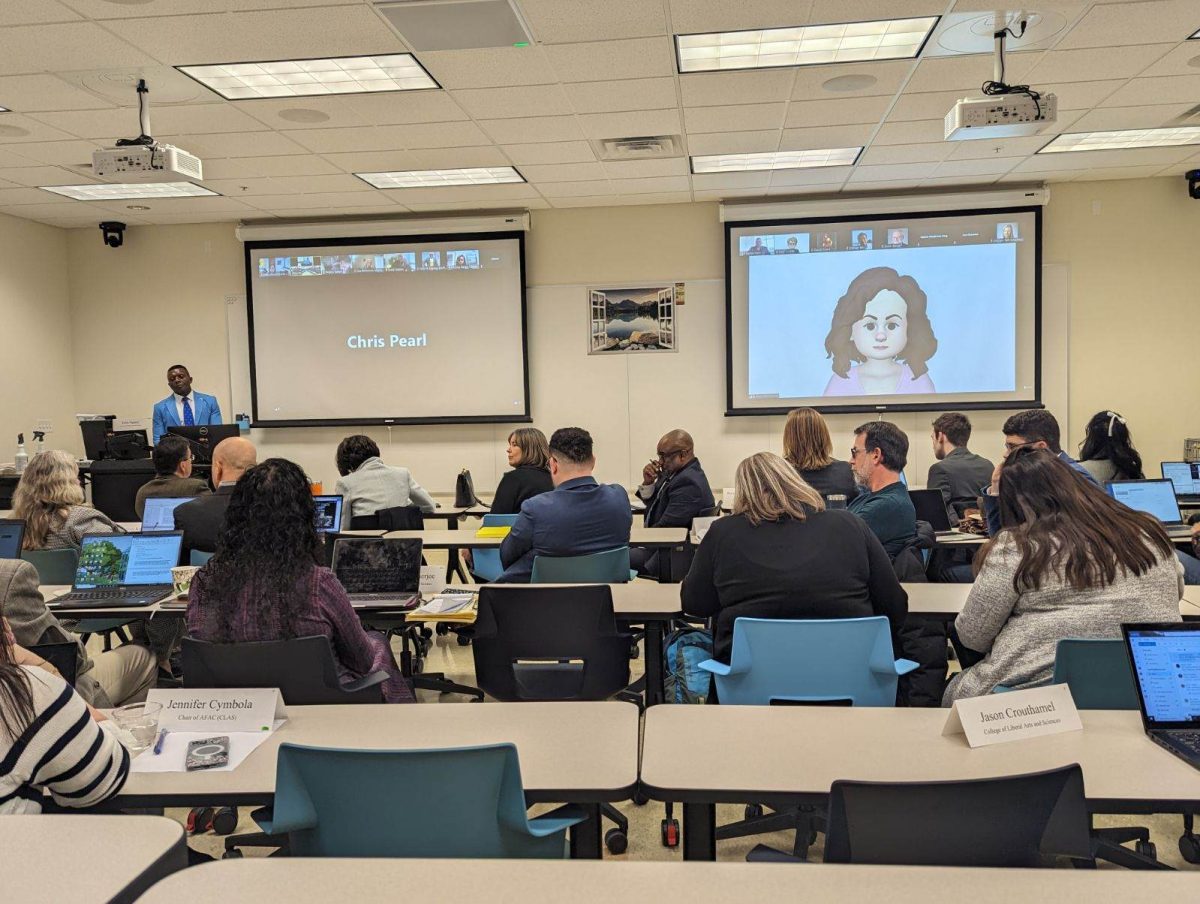Story Revision 2/28- The original article incorrectly attributed ”horror stories” of underprepared Grand Valley State University students to the Fred Meijer Center for Writing & Michigan Authors, where their staff of writing consultants were experiencing “moral injury,” and that they were acting “counter to their own morals and integrity.” The “horror stories” and accounts of “moral injury” instead come from sections within GVSU’s First-Year Writing Program.
For the third consecutive week, the Grand Valley State University Academic Senate (UAS) met to discuss ongoing matters concerning GVSU admissions. The two-and-a-half-hour meeting on Feb. 16 at the Cook-DeVos Center for Health Sciences gave UAS representatives the opportunity to engage in an open dialogue about the effects of GVSU’s increased admission of underprepared students.
GVSU faculty members that serve on UAS detailed their experience of acting as the first responders for students who are ill-prepared to succeed at GVSU. Since they are the ones on the front lines in classrooms and lecture halls across campus, UAS representatives have seen firsthand the consequences of GVSU’s increased admission of students with GPAs below 3.0. This has led faculty to change curriculum, introduce competency based-grading systems for courses and increase office hours to accommodate struggling students.
In the consideration of time and organization, the meeting was structured into three sections. A 30-minute period was given to UAS representatives to lay the foundation for admissions discussions followed by a 30-minute response from Strategic Enrollment Management Plan (SEMP) faculty and leadership. The remaining hour and a half was set aside for a question-and-answer session that was open to all.
Several UAS representatives used their allotted 30 minutes to relay personal experiences and stories from colleagues about the increased rate of students finishing classes with DFW’s (a grade of a D, F or Withdrawal).
UAS representatives cited a higher admission of underqualified students as a major contributor to this issue. Additionally, some representatives said their colleagues have introduced competency-based grading systems and made on the fly changes to curriculum to combat their increased DFW rates.
“There’s not a mystery as to why there’s more DFW students,” said Jason Crouthamel, professor of history at GVSU. “(We have) students who don’t come to class, who are woefully unprepared, and (who) cannot read and write. They’re not prepared for the university level of rigor that we are posing to them.”
Alaina Hogan, a GVSU student and tutor at GVSU’s Student Academic Success Center, said she sees students everyday that are struggling with a typical academic workload. Due to the influx of students with less than a 3.0 GPA, Hogan said professors are spending more time and energy getting unprepared students to an education level they should’ve already been at, which comes at the expense of the education for prepared students. Hogan said she’s heard stories of professors in GVSU’s Department of Mathematics splitting time between upper-level courses and introductory algebra, leaving both students and faculty stretched thin.
What Hogan is describing is happening across the GVSU community.
Scarlet Galvan, GVSU’s Collection Strategist Librarian, said she’s heard “horror stories” from the Fred Meijer Center for Writing & Michigan Authors about the “moral injury” that is occurring as a result of increased admissions of underprepared students.
“If you have people in a stretch course and you really need to get them to this kind of writing by the end of it (the course) and the most you’re able to do is to get them where they should’ve been during their sophomore year of high school, that can be, I think, really painful,” Galvan said.
Galvan said “moral injury” occurs when faculty and staff act counter to their own morals and integrity. In this case, Galvin uses the example of faculty in GVSU’s Department of English that are solely getting students to be at a college level rather than expanding knowledge expected in postsecondary education.
Policies, in terms of admissions requirements, can shape the fututre of the public’s perception of a GVSU degree and college experience. Hogan feels policies discussed by the University puts GVSU at a crossroads for the instiution’s identity.
“It’s whatever Grand Valley decides that it wants to be – does it want to be known for more of its prestige? Does it want to be known for its academic development, or does it want to be known for being inclusive and equitable?” Hogan said. “As a student who’s in higher education and also considering graduate school, I would love for my degree to have some sort of academic prestige to it so that when I do apply for grad schools it’s actually taken seriously.”
Matt Boelkins, professor of mathematics at GVSU, said he rejects the notion that diversity and inclusion are only achieved with lower admission standards. Boelkins said the university could’ve easily maintained their previous admission standards while simultaneously increasing student diversity by taking a slower, smarter approach to growth.
“If the goal was to grow the first-year class by 25%, you could’ve had a five-year plan where you grew it by 5% a year, and (then) you (progressively) scale it up a little bit, (and) hire some more people,” Boelkins said.
Furthermore, Boelkins said he’d like to see an increased emphasis on GPA requirements in the admissions process.
“The university has to tighten up their admission standards (because) who the students are matters,” said Boelkins. “It would be totally reasonable to say we’re not going to admit more than 100 students per year that have less than a 2.75 GPA, and also considerably lower the number of students with (a) 2.75 to 3.0 GPA.”
SEMP leadership, including B. Donta Truss, Vice President for Enrollment Development & Educational Outreach at GVSU, said they appreciated the balance of UAS’ discussions.
Truss clarified during SEMP’s response window to UAS discussions that there is currently a committee solely dedicated to reviewing applicants with a GPA between 2.0 to 2.79. Truss also said, however, this review committee, which was quickly assembled during the pandemic, likely would have benefitted from the inclusion of GVSU faculty.
“I hope that we (SEMP and UAS representatives) get another shot to continue to do this work, and work together because I think there is value that can definitely be added (to the review committee),” Truss said.
Truss further expanded on the committee’s review process for applicants with a GPA between 2.0 to 2.79. Truss said this includes the use of Landscape, a comprehensive admissions tool created by College Board that factors in the full range of an applicant’s background.
Vice President for Student Affairs at GVSU Jenny Hall-Jones, Ph.D., said GVSU is committed to providing faculty and students with the resources they need to succeed. Part of this commitment will come in the form of additional support for the Office of Multicultural Affairs and GVSU residence halls. Additionally, Jones also highlighted some of the steps already taken to assist GVSU students, namely through investment in Disability Support Resources.
“With way more students that are coming in (to GVSU) needing (more) accommodations than ever before, I don’t see that changing,” Jones said. “We hired two more adjunct staff in Disability Support Resources, and we were able to put another $100,000 in the accommodation budget.”
Jones said this money is used to purchase devices and materials required for students with accommodations to succeed.
By and large, UAS representatives for the past three weeks have made it clear that they want a more prominent voice in administrative decisions and programs that largely impact GVSU faculty. UAS representatives said it is imperative that both parties maintain a more collaborative partnership for the future. Many UAS representatives, including Andrew Spear, associate professor and chair of philosophy, believe a key point of emphasis going forward should be administration’s consideration of faculty concern and input in decisions that directly affect faculty and students.
“Sometimes you just (need to) ask a friend if what you’re about to do is a bad idea,” Spear said. “They (GVSU) have (over) 800 friends, a subset of which are always available through our (shared) governance.”























